3 Weeks in Chile: The Ultimate Travel Itinerary

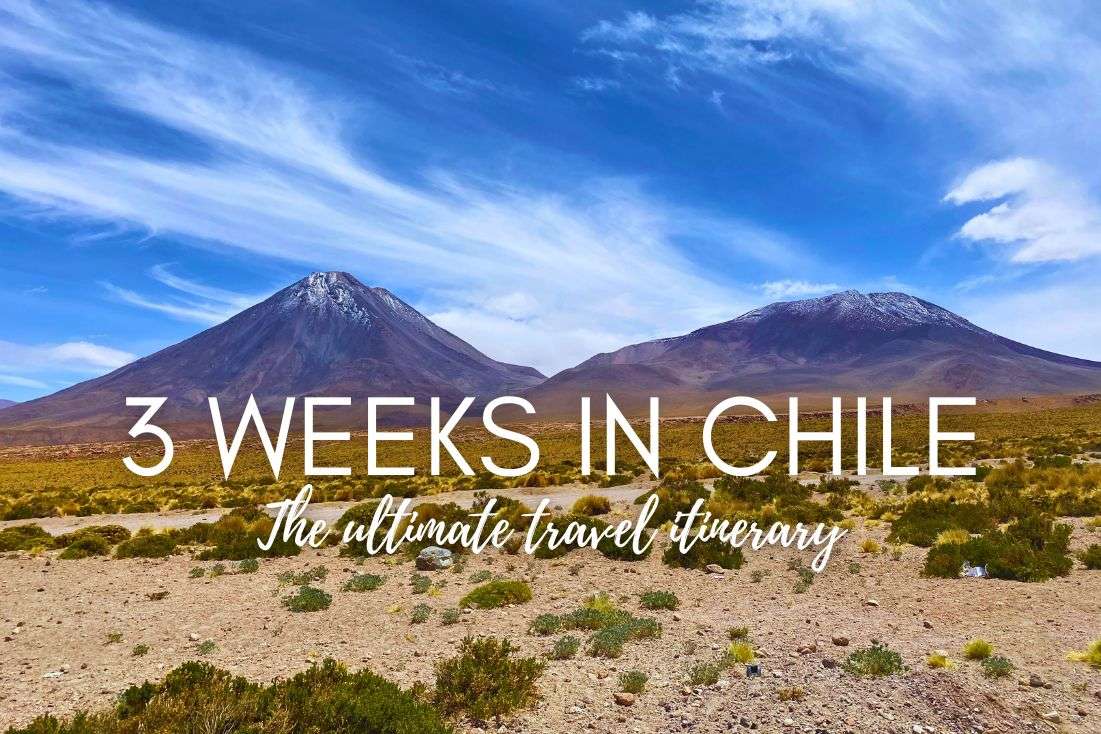
eady to set off on the most incredible Chile itinerary? You better be! There is plenty to discover and I are here to help you plan your 3-week Chile trip to see the best it has to offer.
The driest place in the world? Check! (That’s Atacama Desert in case you were wondering) The magnificent glaciers and majestic mountains in Patagonia? Check! The end of the world at Magellan Strait? Check! And there’s plenty of other places you simply can’t miss—Easter Island for instance. If you keep up the pace, you can cover Chile from north to south and truly experience its jaw-dropping diversity.
I’ve been to every single one of these places myself, so trust me when I say this itinerary is battle-tested. Every tip, route, and recommendation in this guide comes straight from my own adventures, not some secondhand brochure. So, if you’re ready to follow in my well-worn (but still stylish) travel shoes, let’s get started!
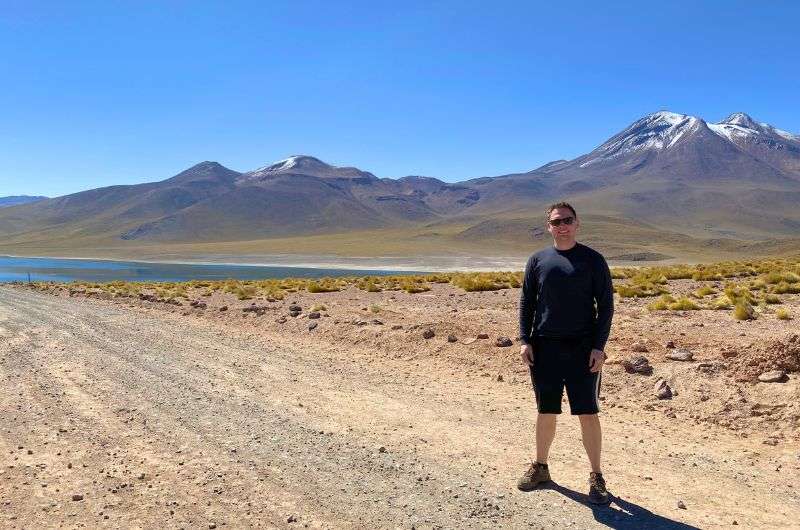
I’ve visited all the places in this itinerary myself, so you know you’re getting firsthand tips and travel advice
What to see in Chile in 3 weeks?
Day 1: Explore Santiago de Chile (Central Chile)
Day 2: Day trip to Valparaíso and Isla Negra (Central Chile)
Day 3: Maipo Canyon and San Francisco Glacier (Central Chile)
Day 4: Arrival in San Pedro de Atacama and Valle de la Luna (Atacama Desert)
Day 5: El Tatio Geysers and Termas de Puritama (Atacama Desert)
Day 6: Atacama Salt Flats and Altiplano Lagoons (Atacama Desert)
Day 7: Mars Valley and Devil’s Throat (Atacama Desert)
Day 8: Travel to Puerto Varas via Calama and Puerto Montt (Lake District)
Day 9: Vicente Perez Rosales National Park and Petrohué Waterfalls (Lake District)
Day 10: Journey to Pucón (Lake District)
Day 11: Villarrica Volcano climb and hot springs (Lake District)
Day 12: Huerquehue National Park (Lake District)
Day 13: Explore Punta Arenas and its maritime history (Patagonia)
Day 14: Travel to Puerto Natales and visit Cueva del Milodon (Patagonia)
Day 15: Torres del Paine: Condor & Cuernos Viewpoints (Patagonia)
Day 16: Glacier Grey kayaking adventure (Patagonia)
Day 17: Hike to Mirador Las Torres in Torres del Paine (Patagonia)
Day 18: Travel to Easter Island via Santiago (Easter Island/Rapa Nui)
Day 19: Discover Easter Island’s Moai statues (Easter Island/Rapa Nui)
Day 20: Explore Orongo village and Ahu Tahai (Easter Island/Rapa Nui)
Day 21: Return to Santiago and depart (Central Chile)

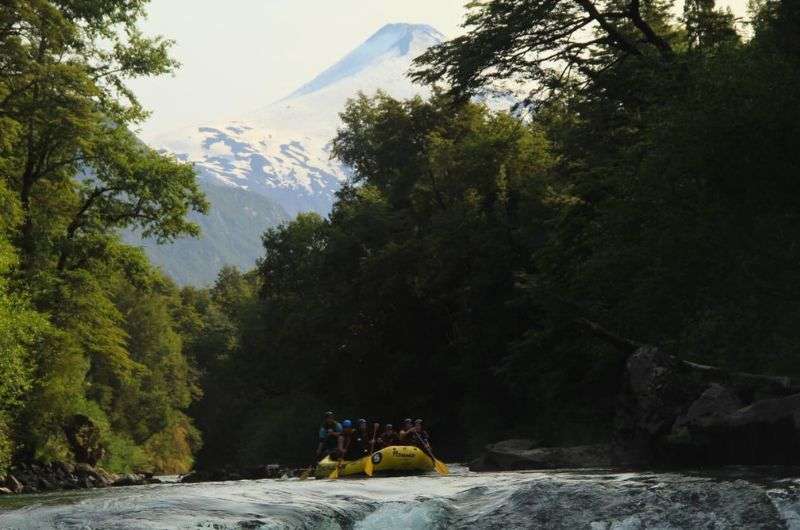
Hang in there, it's going to be quite a ride!
Sometimes, all you need to do is take the first step... I've filtered out the best hotels in Chile for you
Save it for yourself to come back to later, or share with your friends on social media!
My practical tips for exploring Chile
Chile is a land of extremes, stretching almost 5,000 km (2,690 mi) from north to south and boasting four distinct climates. From the bone-dry Atacama Desert in the north to the subarctic wilderness of southern Patagonia, you’ll encounter just about every weather situation imaginable on this Chile itinerary.
Here’s how to make the most of your 3 weeks in Chile:
- Pack for all seasons: Seriously, bring your entire wardrobe. You’ll need everything from desert-friendly gear to layers for the chilly winds of Patagonia.
- Rent a car: It’s the best way to get around and make the most of your time. Without one, you’d need 3 months to cover the same ground (only slightly exaggerating)!
- Multi-city plane ticket: A must-have for covering such a massive country efficiently.
- Carry cash: ATMs are scarce in remote areas, and the exchange rate on Easter Island is much higher than on the mainland. Stack up before you go!
- Gourmet tip: Don’t miss out on Pil Pil—it’s absolutely delicious.
- Plan for the highlights: 3 weeks is just enough time to hit the must-see places, from the Atacama Desert to Easter Island and the glaciers of Patagonia.
- Read my full article with my Chile travel tips to learn more about money, driving, national parks, and more.
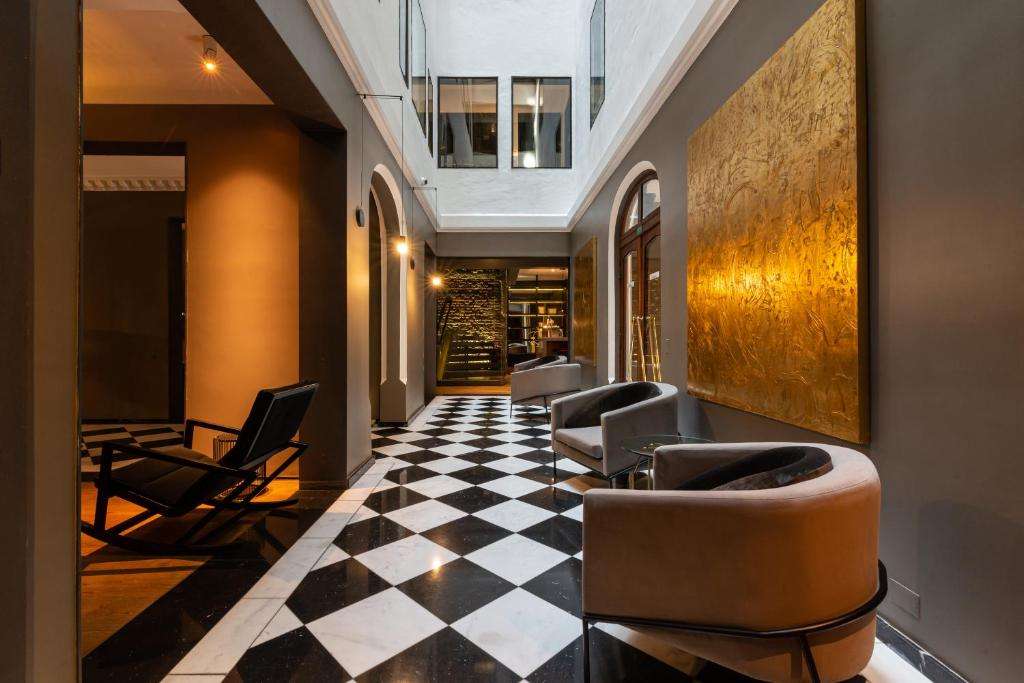
Now that you’re armed with these essential tips, buckle up and get ready to dive into the ultimate 3-week Chile itinerary. Get ready to fall head over heels for one of the most spectacular countries on Earth!

Without a car, it would take you much longer to travel around Chile. Renting a car is essential
Day 1: Santiago de Chile
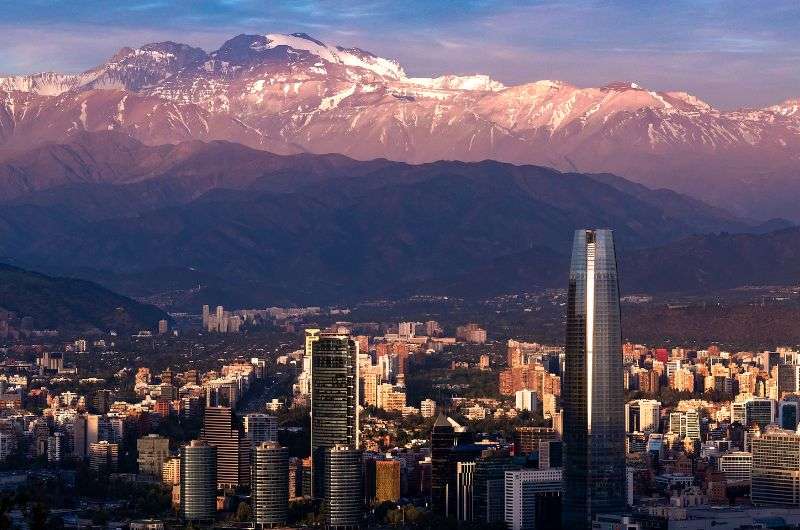
The capital of Chile—Santiago de Chile
We arrived in the morning, so we had the whole day to check off the must-see places in Santiago. And as there are very few of them, we were done by noon. On the other side, it’s wise to plan a light itinerary for the first day.
Santiago lies in the -4 GMT zone, so the jet lag is not as terrible as one might imagine, but still. Take a stroll through the old town and the Metropolitan Park, get yourself something tasty (and glass to your collection) at Hard Rock Café, and call it a day.
- Distance: 9 km (5.6 mi)
- Locations: Plaza de Armas, Bellavista district, Cerro San Cristóbal
- Accommodation: Hotel Magnolia
Day 2: Valparaíso and Isla Negra
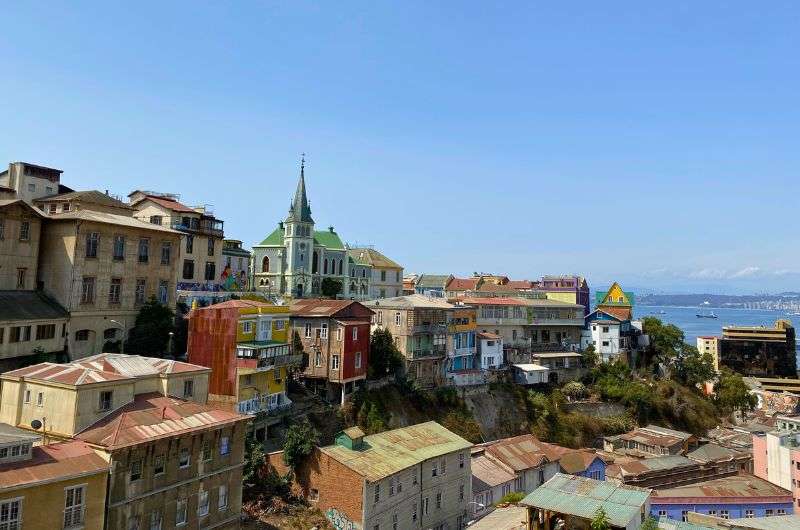
The city of Valparaíso
Good morning, Chile! Get up early and drive to Valparaíso. In case you came from Europe, that won’t be a problem. Thanks to jet lag, you’ll be up early either way.
This artistic city is connected to Santiago with a highway, so we were there within an hour and a half. There are no monuments or museums, but the city itself is a must-see place!
It’s one of the oldest towns on both American continents and nowadays it’s home to street art from all over the world. It reminds me of San Francisco with all the hills and cable cars, only with a stronger Latino feel, more colorful and bohemian. A tour of Valparaiso highlights takes approximately 4 hours. It depends on how much time you take to admire the murals and coastal views.
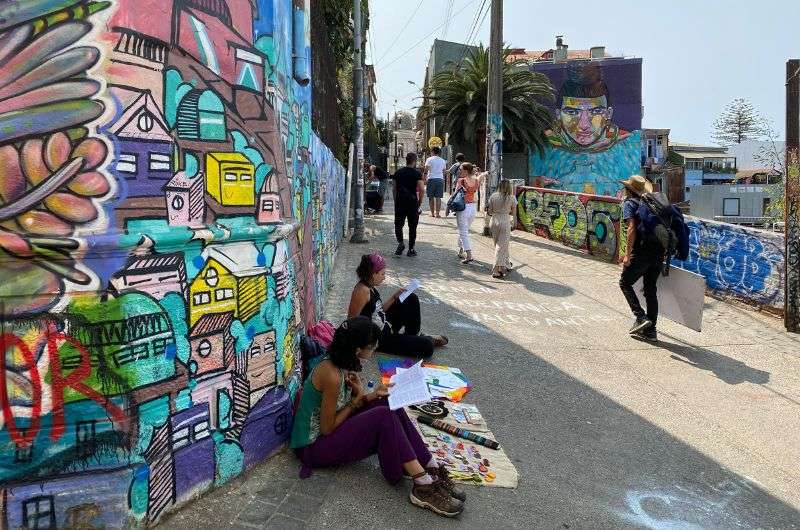
The street art in Valparaiso
Get back to your car and drive south on Route 68 until you see the exit to F-90 which will take you to Isla Negra—the most interesting house in a wonderful setting. It’s mostly famous for being the residence of Nobel-prize writer Pablo Neruda. I’m not a huge fan of his, but the place is simply too amazing to miss out on. The romantic setting on the shores of the Pacific Ocean and the sophisticated layout will take your breath away!
This is a full-day trip. Go to Valparaíso in the morning, have lunch there, and save Isla Negra for the afternoon. You'll get back to Santiago right in time for dinner and perhaps a drink.
Read more: Detailed information about Santiago, Valparaíso, and Isla Negra, including maps and opening hours, can be found in my other article: Things to do in Santiago de Chile.
- Distance: 307 km (191 mi)
- Locations: Santiago, Valparaíso, Isla Negra
- Accommodation: Hotel Magnolia
Day 3: Maipo Canyon & San Francisco Glacier
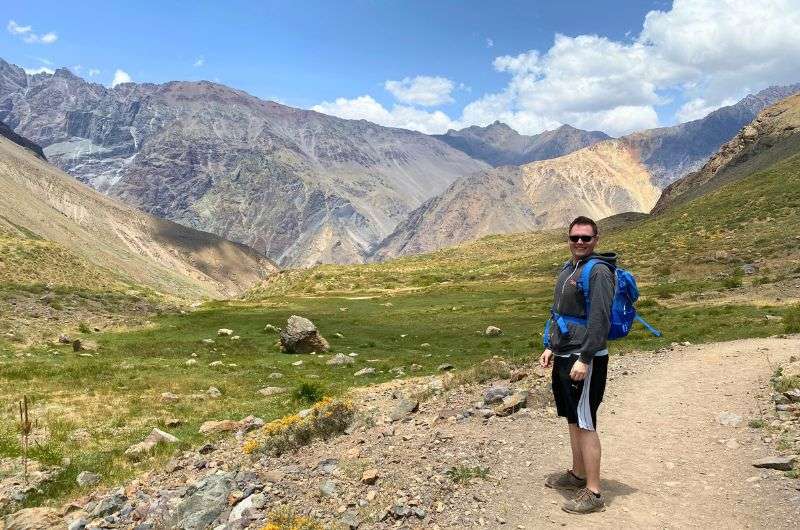
On my way to San Francisco Glacier surrounded by towering mountains
One of the day trips I took from Santiago was to Maipo Canyon (El Cajón del Maipo). Want to see the most awe-inspiring viewpoints near Santiago? This place is it.
There are many 6k mountains in the area, which makes this place ideal for hiking and climbing. It was the first time that I saw such huge mountains face to face, and I was stunned.
One of the must-see places around is El Yeso dam and San Francisco Glacier. The vistas are going to make your jaw drop. There are plenty of hiking routes to take, however, due to limited time I had I decided only to hike to San Francisco Glacier, which was amazing.

- Distance: 216 km (134 mi)
- Locations: Santiago, El Cajón del Maipo, San Francisco Glacier
- Accommodation: Hotel Magnolia
Day 4: San Pedro de Atacama
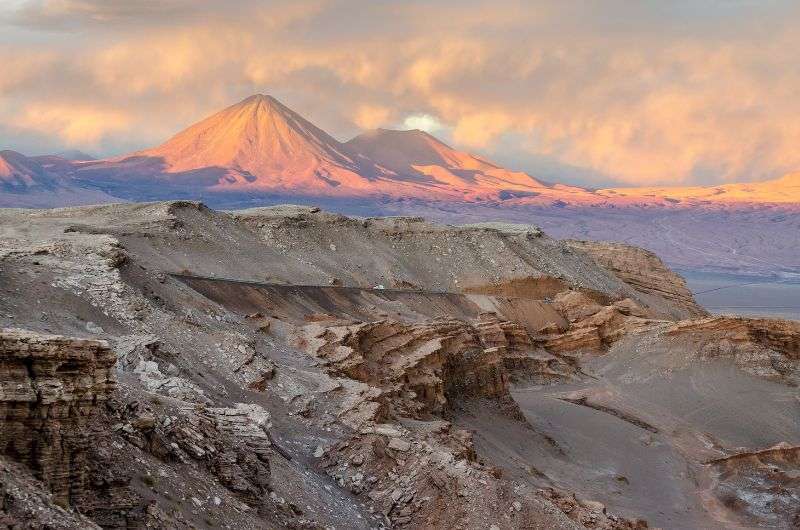
Are we on the moon? Could’ve fooled me! Valle de la Luna in San Pedro de Atacama
The Atacama Desert wasn’t a place I originally had planned to visit, but somehow, I found myself there anyway. And voila, it turns out being surrounded by sand and salt flats can actually take your breath away—either from the jaw-dropping views or the sheer lack of humidity.
The heart of the Chilean desert, San Pedro de Atacama, offers beautiful landscapes with 6,000 m (19,600 ft) volcanos all around, skies of thousands of colors, and vast dunes and rock formations.
The flight from Santiago to Calama takes around 2 hours, then you need to get to San Pedro by shuttle bus, or in a rented car (which is the better option, as you will need it for the other trips in the area too). The drive to San Pedro takes slightly more than an hour, so if you leave Santiago in the morning, you’ll manage to get to San Pedro by noon.
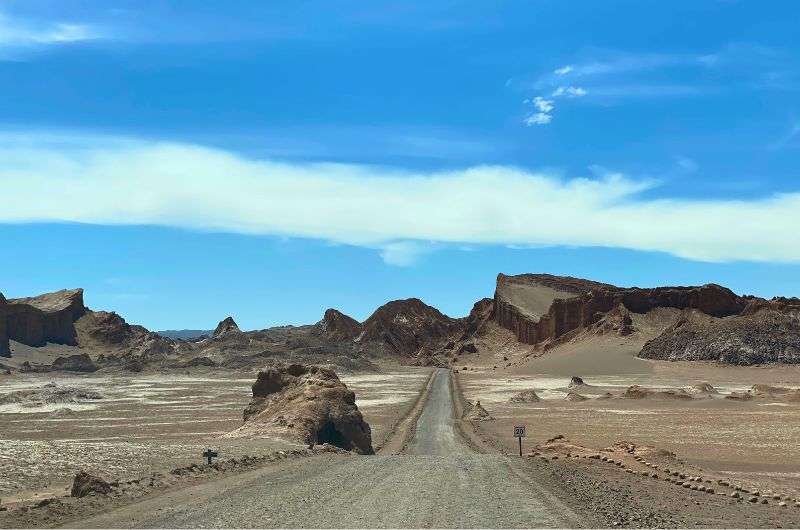
Driving to San Pedro de Atacama is an experience—you just don’t see this type of landscape where I’m from!
Pro tip: San Pedro de Atacama is the only place in Chile where you need a gasoline-powered car because of the high altitude (diesel engines struggle in these conditions). Plus, it’s a desert with dusty roads everywhere, so I recommend renting an off-road model.
There are many interesting places around San Pedro you should squeeze into your itinerary, but this afternoon, start easy with a trip to Valle de la Luna. It’s most famous for its splendid sunset landscape but there are also great dunes and amazing rock formations to check out.
- Distance: 117 km (72.7 mi) from Calama to San Pedro (including the surroundings) + 1,500 km (953 mi) flight from Santiago to Calama
- Locations: Santiago, Calama, San Pedro de Atacama, Valle de la Luna
- Accommodation: Hotel Pascual Andino
Day 5: El Tatio Geyser Field
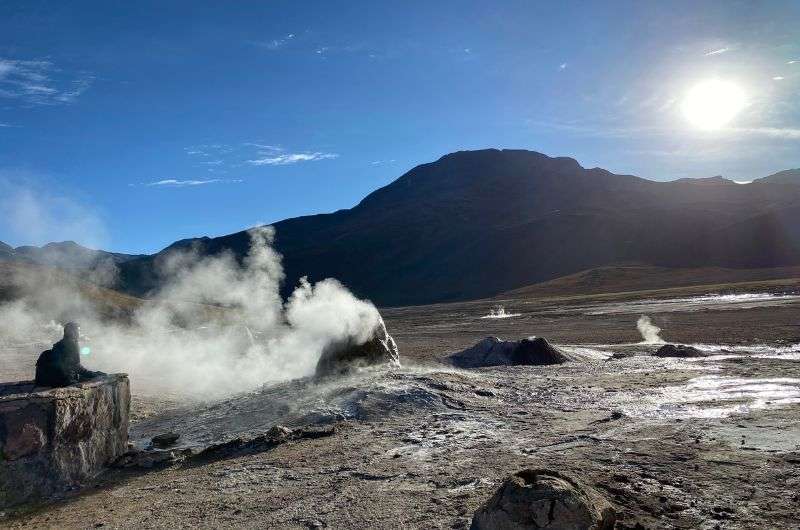
El Tatio Geysers are best visited in the morning
Get up very early in the morning to make the best of the El Tatio Geysers—the top place to see in San Pedro. If you’re from Europe, jet lag will prevent you from sleeping anyway.
The geyser field is the highest in the world at 4,320 m (14,173 ft) above sea level. That means two things: wear layers because it’s really cold up there, and be aware of mountain sickness. Coca leaf tea can help sooth your symptoms.
In my opinion, the best thing about El Tatio is the route up there. You need to set off super early to experience hot steam (they are not visible in the afternoon) which also means you’ll get to see the desert waking up. And that’s magic I can’t describe.
One of the best photo spots is Vado Rió Putana, approximately halfway to El Tatio. The wetlands are full of life in the morning and the volcano serves as a perfect backdrop. Even the photos don’t do it justice, so no oversleeping!
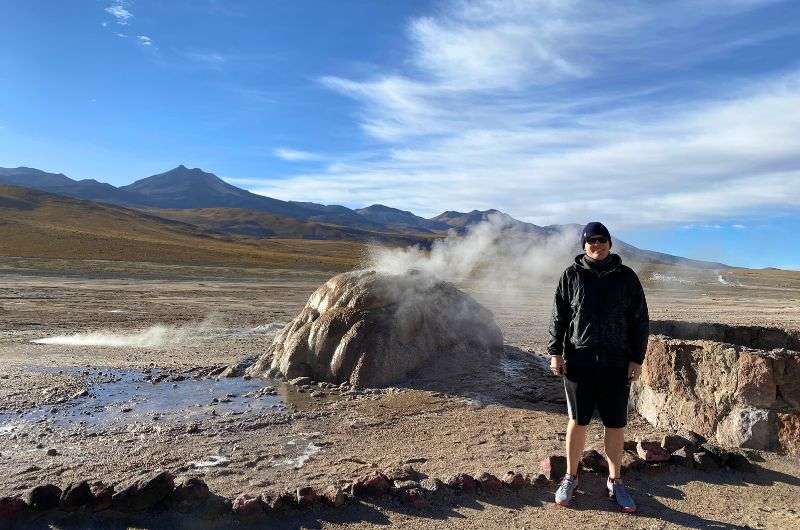
So fascinating!
Pro tip: Book your visit of Termas de Puritama 2 days ahead and soak in the natural hot spring on your way back to San Pedro.
- Distance: 158 km (98 mi) out and back
- Locations: El Tatio Geysers (Vado Río Putana, Termas de Puritama)
- Accommodation: Hotel Pascual Andino
Day 6: Atacama salt flats (Salar de Atacama)
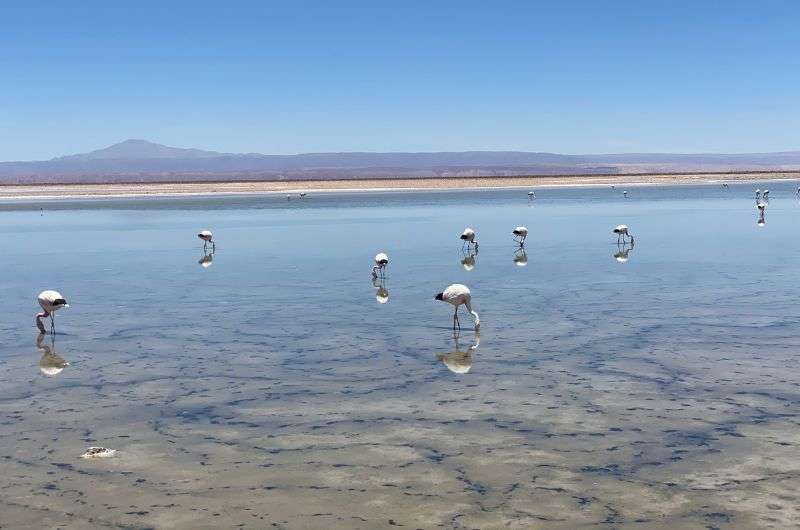
The lagoon is inhabited by beautiful flamingos. They let you come up really close, which is fun
Your next one-day trip will be to the salt flats of Atacama. The large salty lagoons in high altitudes are filled with flamingos and are breathtaking at first sight.
Laguna Chaxa Park is a part of Los Flamencos National Reserve located 60 km south of San Pedro and comprises several highlights, including the two perfectly round-shaped lagoons called Ojos de Salar.
Further south, the incredible Altiplano Lagoons lie at the feet of the massive volcanoes. The two lagoons, Miscanti y Miñiques, used to be one until the petrified lava split them in two.
Packing tip: Don’t forget to bring sunscreen, a hat, and lip balm, as there’s no place to hide and the average temperature hovers around 40°C (104°F).
- Distance: 232 km (144 mi) out and back
- Locations: Laguna Chaxa Park, Ojos de Salar, Miscanti and Miñiques lagoons
- Accommodation: Hotel Pascual Andino
Day 7: Mars Valley and the Devil’s Throat
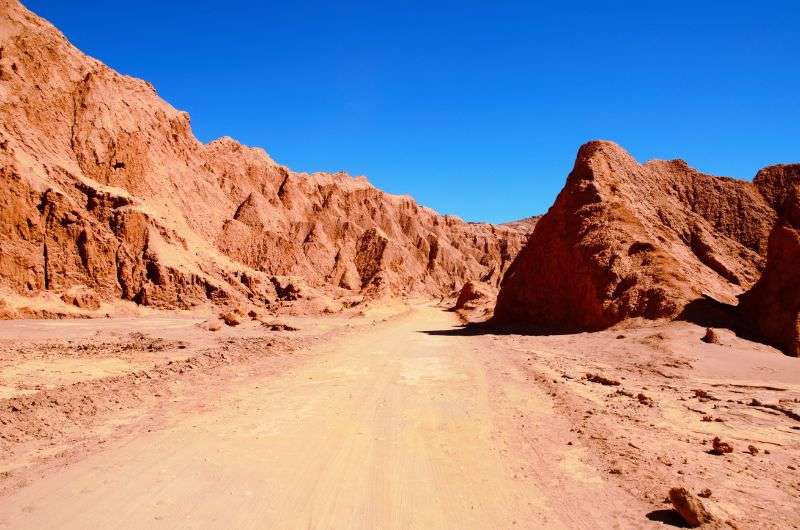
Mars Valley
The last day in San Pedro will belong to death! Nah... let’s leave Death Valley to California. In San Pedro, it’s called Mars Valley (Valle de Marte), Death Valley is just the outcome of the silly linguistic distortion.
"Is there life on Mars?" David Bowie once asked. Well, in San Pedro's Mars Valley, there is! It lies on the edge of the town with its majestic dunes and rugged landscape and it’s one of the most popular tourist destinations in Atacama. There’s also an ancient rock fortress towering over the valley and a Devil’s Throat viewpoint just a stone’s throw away.
It’s all within 7 km (4.3 mi) from San Pedro, so it’s easily accessible by car, bike, or even by foot (not recommended unless you want to become a human French fry due to the unbearable heat).
Read more: Practical information about entrance fees and facts, as well as more photos, are covered in my full article about Top Places in San Pedro de Atacama.
- Distance: 14 km (8.6 mi) out to Devil’s Throat and back, count with some extra distance walking around
- Locations: Valle de la Muerte, Pukará de Quitor, Devil’s Throat
- Accommodation: Hotel Pascual Andino
Day 8: Calama, Puerto Montt, Puerto Varas
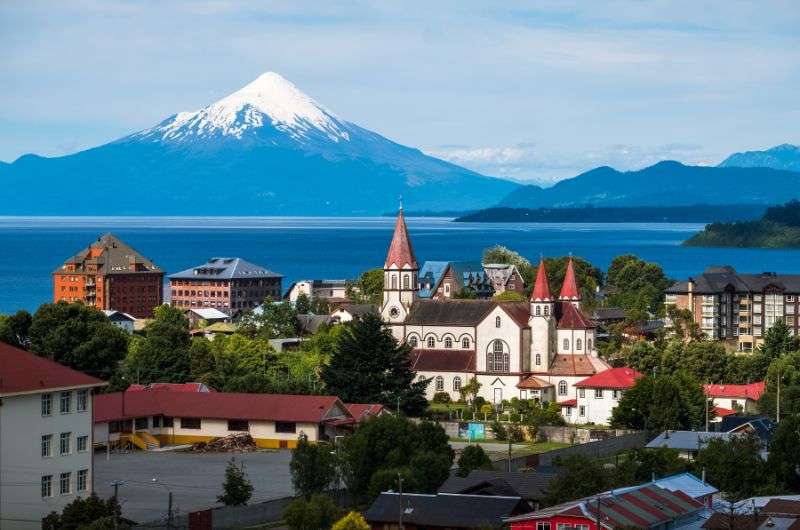
Puerto Varas will be your next base
I stayed for 3 nights in Puerto Varas, and honestly, I don’t think that’s enough to enjoy all the region has to offer. Unfortunately, you would need at least a 1-month Chile itinerary to explore it all properly, and nobody has that kind of time!
Upon arrival, I think the best thing is to get settled in your hotel and head out to one of the many great restaurants for Pil Pil—a delicious Chilean meal. Take some time to relax and recharge your batteries.
- Distance: thousands of miles and then around 20 km (12.5 mi) from the airport to Puerto Varas
- Locations: Calama, Puerto Montt, Puerto Varas
- Accommodation: Hotel Cumbres
Day 9: Vicente Perez Rosales and Petrohué Waterfalls
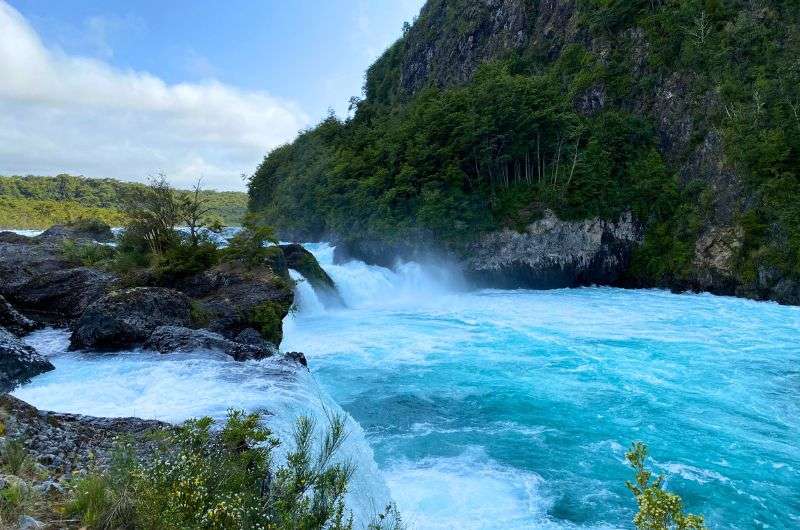
On your way to Vicente Perez Rosales National Park, don’t forget to stop by Petrohué Waterfalls
Petrohué Waterfalls stand on the way to Vicente Perez Rosales National Park about an hour’s drive from Puerto Varas. I planned this as a whole day trip, so we had enough time for a hike. The crystal-clear waterfalls running down the pitch-black volcanic rock are literally amazing.
The waterfalls are at the very beginning of the park. Continue further and try one of the hikes around the lake, with a view of Osorno Volcano.

Warning! Just don’t plan this trip for January, or you’ll get eaten alive by the blood-sucking Chilean horse flies. I missed the memo about these annoying insects, and they were a real nuisance.
For detailed information about the hikes, maps, and other useful tips, read my article about the top things to do in Pucon and Lake District
- Distance: 55 km (34 mi) to the park + hikes
- Locations: Vicente Perez Rosales NP, Petrohué Waterfalls
- Accommodation: Hotel Cumbres
Day 10: Puerto Varas and Pucón, Chile’s Lake District
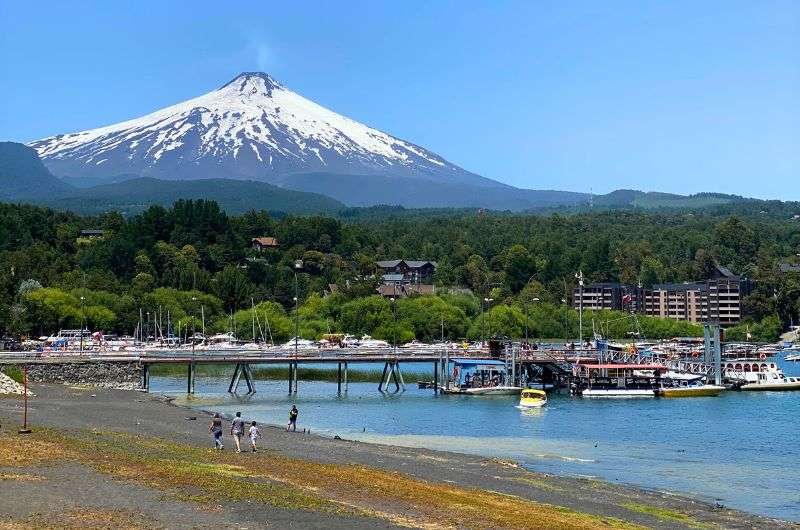
Pucón on the shores of Lake Villarrica
Pucón is a super cute city on the shores of Lake Villarrica with cozy cafés, good restaurants, and nice beaches. The plan for the rest of the day is clear: fill your belly, book a tour to Villarrica Volcano, take a stroll on the beach, and call it a night. You will need all the strength you can muster up for tomorrow.
- Distance: 321 km (200 mi)
- Locations: Puerto Varas, motorway, Pucón
- Accommodation: Hotel Antumalal
Day 11: Villarrica climb and soaking in hot springs
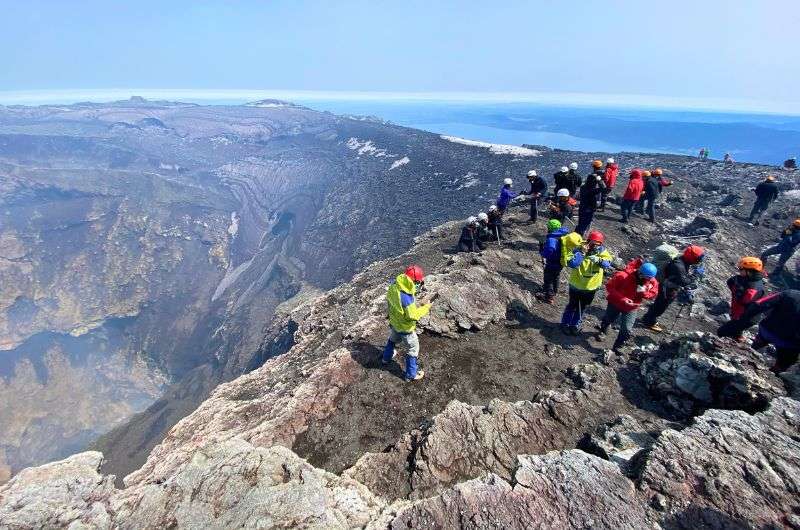
The climb to Villarrica Volcano was a real adventure
Now, I understand, this is not a hike for everyone. It’s really challenging, so if you don’t feel up for it, don’t go there. There are plenty of other fun outdoor options to fill your day with. Try out the hot spring baths of Termas Geometricas for instance (they are excellent, especially after the hike).
I put together a full article explaining how to hike Villarrica, including preparation, my tips, and a trip report. Spoiler: It's tough, smelly, and slippery!
- Distance: 20 km (12.5 mi) in a bus + around 1,500 m (4,921 ft) ascent
- Locations: Pucón, Villarrica Volcano
- Accommodation: Hotel Antumalal
Day 12: Huerquehue National Park
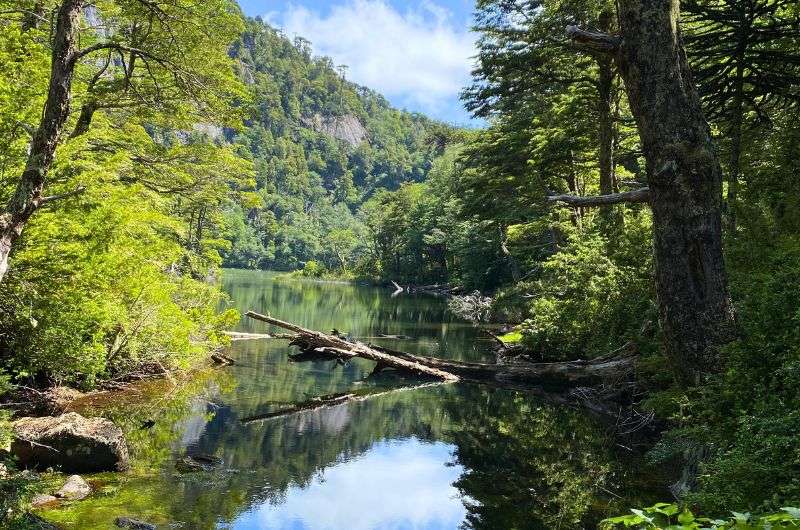
Beauty of National Park Huerquehue
Next to Villarica National Park there’s the extremely beautiful Huerquehue National Park. It’s situated 35 km (22 mi) northeast of Pucón and offers plenty of amazing hiking routes. It’s one of the oldest national parks in Chile, dating back to 1912.
I took a whole day to explore the park and to visit the Tres Saltos Waterfalls on my way back. Check out my article on the 8 Highlights of Patagonia for more info about all the hikes and possibilities.
- Distance: 35 km (22 mi) by car + whatever hike you choose
- Locations: Pucón, Huerquehue NP
- Accommodation: Hotel Antumalal
Day 13: Back to Puerto Montt and off to Punta Arenas (Magellan Strait)
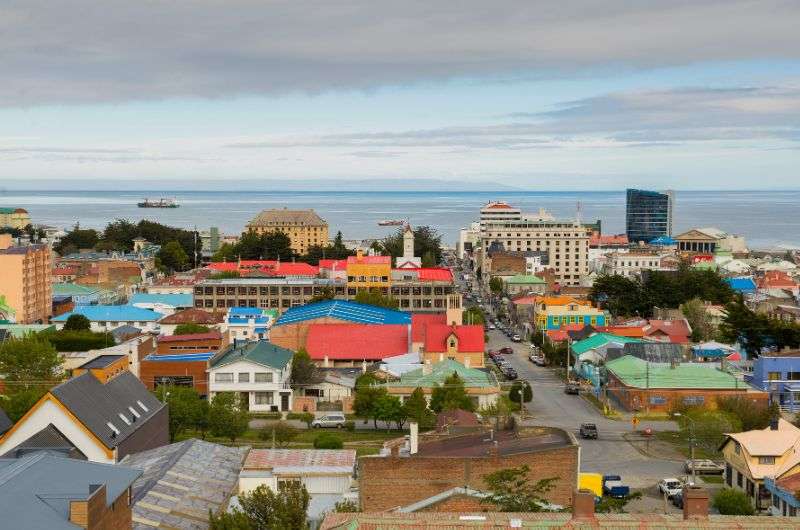
I loved the atmosphere of Punta Arenas
First, you need to get back to Puerto Montt to return the car and hop on a plane. That will take you around 4 hours, including the 2-hour flight and extra time reserved for airport logistics, you can be in Punta Arenas early in the afternoon.
What did I like in Punta Arenas?
- Lord Lonsdale
A rusty, century-old shipwreck chilling on the shore like it’s too cool to care. It’s a moody, Instagrammable reminder of Punta Arenas' maritime history and just how unpredictable Patagonia can be.
- Museo Nao Victoria
A museum where you can climb aboard replicas of historic ships like Magellan’s Victoria—because who doesn’t want to feel like a 16th-century explorer, minus the scurvy?
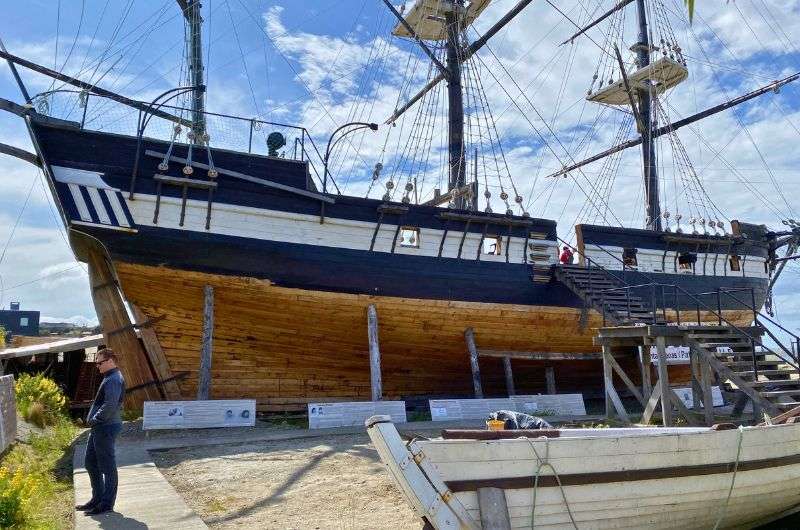
Museo Nao Victoria with all the huge historic boats you can walk through
- Costanera
A waterfront promenade with views of the Strait of Magellan, perfect for a breezy stroll or pondering life’s big questions while dodging some enthusiastic seabirds.
- Isla Magdalena
Penguins. Thousands of them. Strutting around like they own the place, which, let’s be honest, they kind of do. Just try not to smile—impossible!
Punta Arenas is as south as you’ll get on your way. Located on the Magellan Strait, it’s Chile’s southernmost city. Take the afternoon to explore the town. I promise you’ll feel like you are in an Antarctica drawing room, with gusts as strong as 100 km (62 mi) per hour; it’s tough weather out there! There’s nothing much to explore, it’s more about the atmosphere, so 4 or 5 hours are more than enough.
- Distance: a few thousand kilometers by plane
- Locations: Punta Arenas, Magellan Strait
- Accommodation: Patagonia Apart Hotel – Suite
Day 14: Torres del Paine: Puerto Natales and Cuevas del Milodon
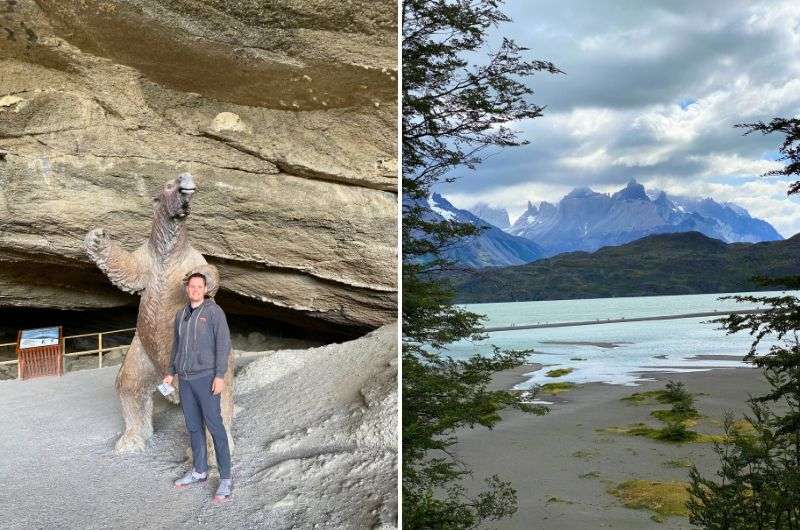
My favorite, the epic Torres del Paine National Park in Patagonia
The next stop on your Chile itinerary is Puerto Natales, a harbor town 250 km northwest of Punta Arenas and the gateway to Torres del Paine National Park. Hit highway no. 9 and you’ll get to Puerto Natales in less than 3 hours. The park’s official website issues a handy road map you can download to get your bearings around the area.
Outside the city, around 20 minutes by car, lies Cueva del Milodon. The large cave used to be a refuge for many giant prehistoric animals. There’s a museum, several caves, and a rock formation called Silla del Diablo you can explore. Plan around 3 hours for the visit including the route there and back.
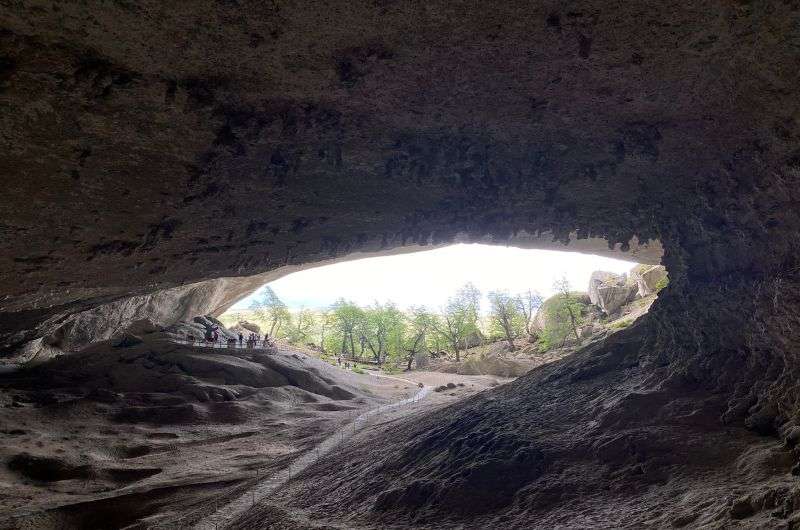
Cueva del Milodon
Then, head back to the city for a good meal and a restful sleep before the upcoming trip to Torres del Paine.
Honestly, there’s nothing to do in the town itself except fill your memory card with epic ocean landscape photos or try Chilean cuisine. So, if you somehow manage to spare some time to kill, the waterfront is the place to go.

- Distance: 310 km (193 mi)
- Locations: Puerto Natales, Cueva del Milodon, Silla del Diablo
- Accommodation: Hotel Vendaval
Day 15: Condor & Cuernos Viewpoints (Torres del Paine)
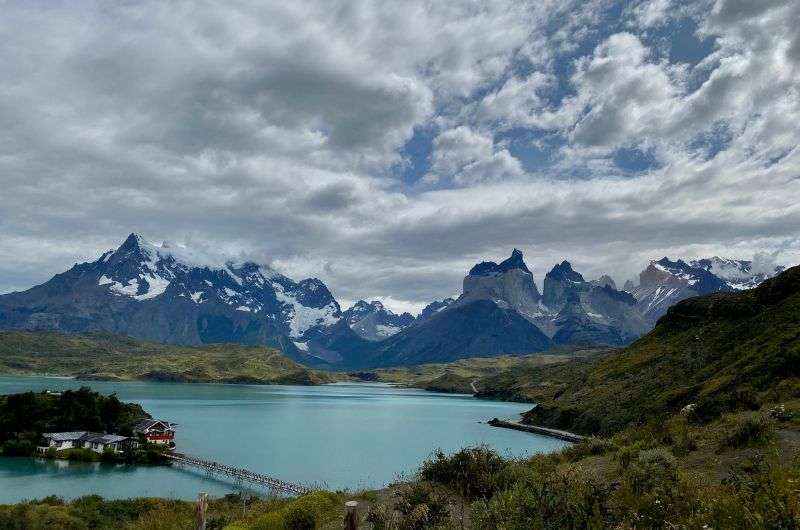
The Condor Lookout in Torres del Paine was the absolute best!
And, finally, the crown jewel of Chilean Patagonia: Torres del Paine National Park.
It’s 80 km (50 mi) from Puerto Natales to Torres del Paine. I prefer to stay in the town and travel back and forth to different destinations in the park.
There are many accommodation options in Torres del Paine, I just think the service quality doesn’t match the high prices. Stay at Hotel Vendaval or AKA Patagonia in Puerto Natales instead.
Counting an hour and a half to get to Torres del Paine National Park and the same amount of time to return, let’s say you have about 8 hours for hiking (I did count in a lunch break too of course). Anyway, hiking in Torres del Paine is the clear best activity in the national park.
The best hikes in Torres del Paine
Drive to the Pehoé Lake and try out the Condor Lookout Hike. It’s an easy, short hike, suitable for anyone. The route then continues along the lake shore further north.
You can pop into one of the hosterias on the way for lunch and continue to Cuernos Lookout, a truly spectacular hike that offers breathtaking views of Salto Grande Waterfall with almost zero effort.
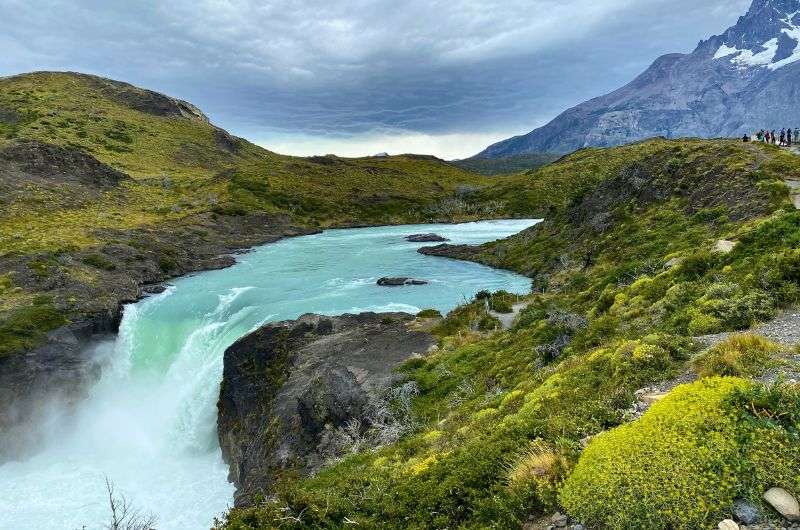
Salto Grande Waterfall
Distance: 17.5 km (11 mi) of hiking + 212 km (132 mi) of driving
- Locations: Lake Pehoé, Condor Lookout, Salto Grande Waterfall, Cuernos del Paine lookout, Lake Nordenskjöld
- Accommodation: Hotel Vendaval
Day: 16: Glacier Grey kayaking
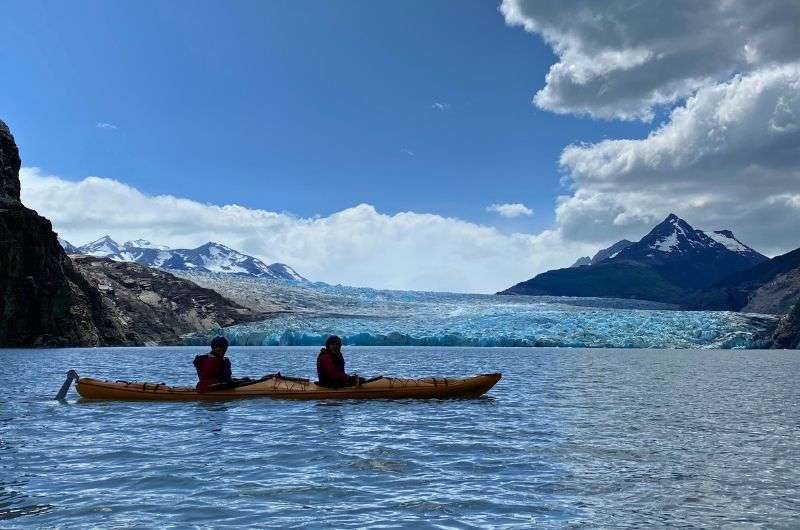
In Torres del Paine, you have to try kayaking to Glacier Grey—it's unforgettable
Don’t forget to pack warm clothes and some snacks with you, as this is a full-day trip. The expedition takes about 2.5 hours, plus the ferry ride (1.5 hours there and back) and traveling between Torres del Paine and Puerto Natales. However, it’s an absolute must.
I would even go as far as saying that if you haven’t seen Glacier Grey, you haven't been to Torres del Paine.
- Locations: Lake Grey, Glacier Grey
- Accommodation: Hotel Vendaval
Day 17: Mirador las Torres—Hiking to the base of Torres del Paine
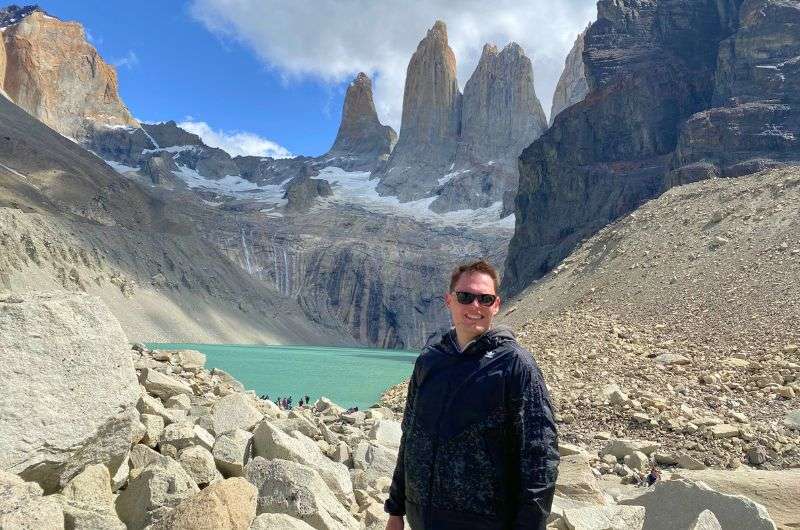
Las Torres (towers) and me!
This is your last day in Torres del Paine and the Mirador Las Torres Trek is mandatory...after all, the three “Towers of Paine” peaks are the most iconic landmarks of Torres del Paine and the whole national park carries its name.
It starts in front of Hotel Las Torres, which is less than a 2 hour drive from Puerto Natales. The hike to Mirador Las Torres is quite challenging though, so plan on 7–8 hours for the hike to enjoy the views. As you can see from my face on the photo above, it’s tough but wonderful.
- Distance: 17.5 km (10.8 mi) of hiking + 244 km (156 mi) of driving
- Locations: Lago Torres, Torres del Paine
- Accommodation: Hotel Vendaval
Day 18: Flight to Santiago and off to Easter Island
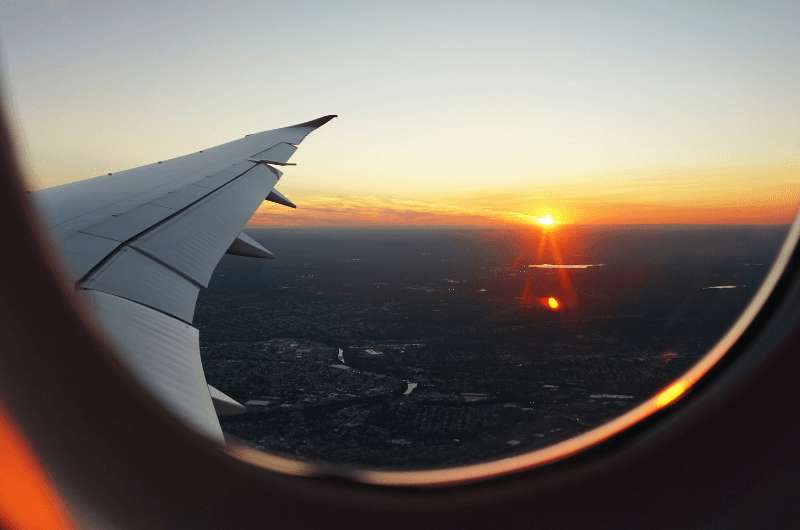
Let’s head to Easter Island!
I’m sorry to inform you that this is another travel day. Many people think that they will do Easter Island (official name: Rapa Nui) as a one-day trip from Santiago. Sure, be my guest, if you want to spend 10 hours on a plane and 2 on the actual island, as it lies exactly 3,746 km (2 327 mi) west of Chile.
One step at a time: first, get back to Punta Arenas, return your rental car, and hop on a plane to Santiago. Since there are only two or three flights a day to Easter Island even in the high season, be sure to plan your flight from Punta Arenas accordingly.
Pro tip: The flight from Santiago to Easter Island may also be delayed due to strong winds, so maybe bring yourself a good book in case that happens to you.
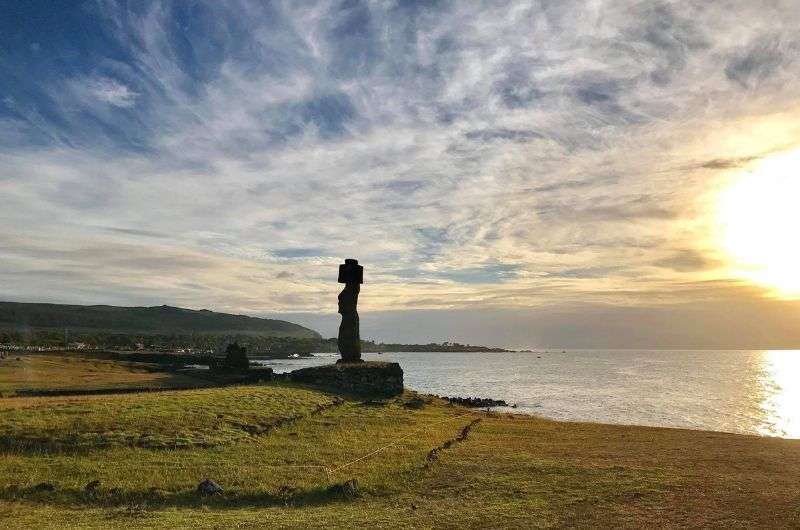
And here we are!
Although getting there is lengthy and exhausting, Easter Island is one of the most mysterious places on the planet, so you simply can’t miss out on it. Don’t you think it would be a shame to put together a whole Chile itinerary and not go the extra mile (several thousands in this case) to see the Moai statues in real life?
Tip: LATAM is the only airline operating between Easter Island and Chile (on a Boeing 787). Look up the flights directly from their official website in the Chilean version. It’s known that the website charges significantly more in the US version, even in the low season.
- Distance: a few thousand kilometers by plane
- Locations: Punta Arenas, Santiago de Chile, Easter Island
- Accommodation: Hotel Hare Uta
Day 19: Easter Island’s Moai statues
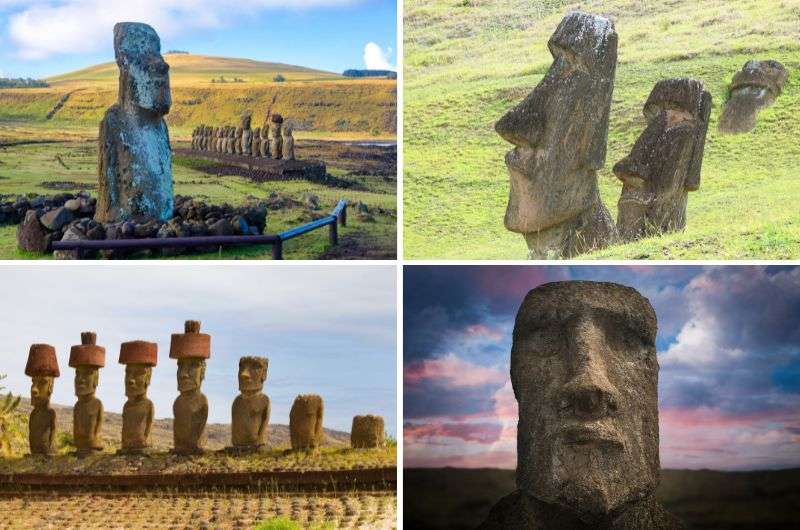
Maoi statues of Easter Island
Let your Easter Island adventure begin! The one thing you’ve been craving to see is the famous Moai statues, right? Well, they’re all over the island. The most famous ones are to be found in the Rano Raraku quarry which is part of the Rapa Nui National Park.
Easter Island is pretty small, so don’t worry that you’ll have just two days to spend there. From the capital Hanga Roa, which is basically the only proper city on the island, it’s just 13 km (8 mi) to the tourist hotspot with the statues. This is why Easter Island is the only place in Chile I won’t tell you to rent a car at. You can rent a bike though, or scooter in case you’re too tired to pedal.
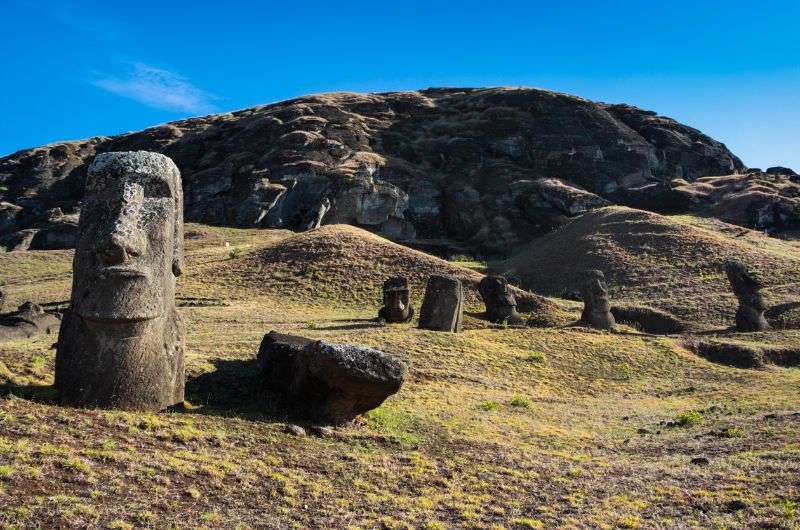
Let’s head to Rano Raraku!
My advice is to get up early to catch the sunrise at Rano Raraku and immerse yourself in the magical atmosphere. There’s one road leading along the entire east coast with the statues scattered around it.
There are tour guides available that will passionately talk to you about the Rapa Nui culture in English, but I recommend reading up on it in advance and going on your own. Not only you will be free to move at your own pace around the island, but you’ll also avoid the crowds and enjoy the sunrise in peace. Moreover, you’ll have the chance to take the best shots of the landscape with only the freely grazing horses to pose for your photos.
Here’s a map of the suggested route on Easter Island that hits all the main points of interest.
- Distance: 42 km (26 mi)
- Locations: Rano Raraku, Papa Vaka Petroglyphes, Hanga Roa
- Accommodation: Hotel Hare Uta
Day 20: Mysterious Orongo Village and Ahu Tahai
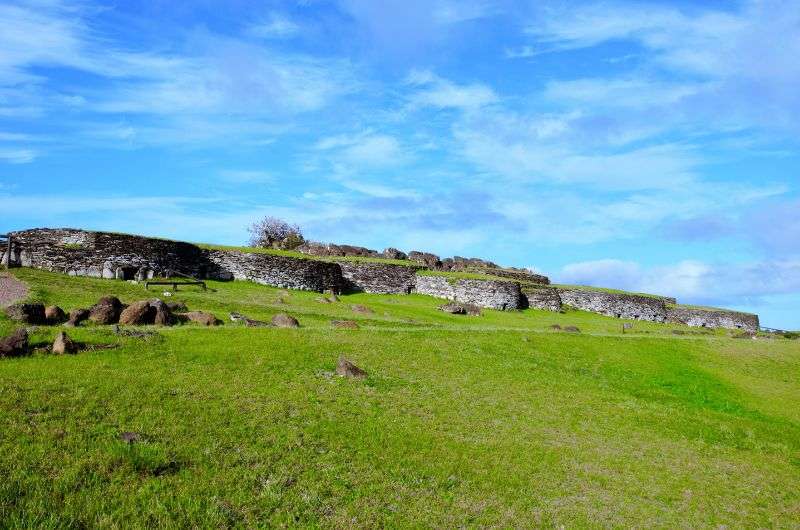
Orongo Village
On your second day on Easter Island, I suggest heading out to Orongo stone village, where you can still see the remnants of the original architecture.
On top of that, the little hill called Rano Kau is a dormant volcano with a freshwater lake in the crater and a stunning view.
During the rest of the day, you can visit the Rapa Nui Museum in Hanga Roa, kick back on the beach, see one of the cultural dancing shows, have something to eat, and watch the sunset at the magical Ahu Tahai monument right on the edge of the city.
- Distance: 15 km (9.3 mi), counting the trip to Orongo and back with a stroll around the city
- Locations: Orongo village, Rano Kau viewpoint, Ahu Tahai, Hanga Roa
- Accommodation: Hotel Hare Uta
Day 21: Travel back to Santiago and time to go home
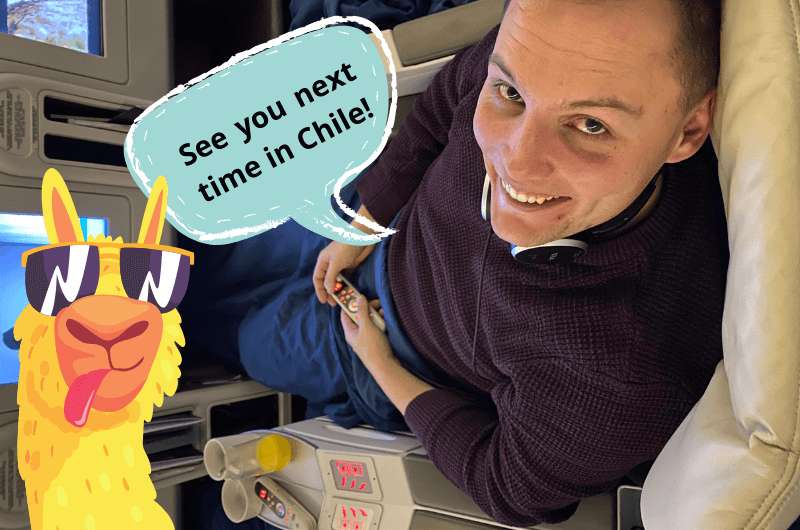
No, I was not this happy about leaving Chile... I was happy about the business class service! Read my full review of Air France Business Class to see why you should never fly economy again!
And here we are, at the end of our glorious Chile itinerary. As I said earlier, the more time you have for Chile, the better. This 3-week Chile itinerary covers all the must-see places, but there’s always more you could add if you have the time. Chile is a large country and there’s something amazing at every corner.
Further reading:
- All You Need to Know About Traveling to Chile: 15 Tips and Tricks
- All You Need to Know About Climbing Villarrica in 4 Steps
- 8 Highlights from my Visit to Patagonia
- 20 Best Day Hikes in Chile of Various Difficulties
Sometimes, all you need to do is take the first step... I've filtered out the best hotels in Chile for you
Save it for yourself to come back to later, or share with your friends on social media!
This post contains affiliate links. I earn a small commission if you make bookings through my links, at no additional cost to you. Thank you for your support!




Comments | Thoughts? Give us a shout!
Recommended articles
Ready to explore the best of hiking in Torres del Paine? I’ll show you the top Torres del Paine hiking trails and adventurous activities you can't miss. If you visit just one place in Chile, make it Torres del Paine.
The food scene in Chile is like a wild ride through flavors. Chilean food culture is rich and diverse, influenced by indigenous traditions, Spanish colonial history, European immigrants, Chile’s neighboring countries, as well as its geography. And I consider it the best cuisine outside of the EU!
Torres del Paine is not only a national park but also a national gem of Chile. It has it all: glaciers, lakes, and mountains. Where to stay, what to see, and what to pack? Read in and find out.
About me
Hi, I’m Jan. I travel fast and intensely, whether I’m exploring the buzz of Tokyo in 3 days or road-tripping through mountains and beaches on a 3-week Thailand adventure. And no matter where I am, you’ll always find me in a comfortable hotel at night and eating the best food.
If that sounds like your kind of journey, hop on board, and let’s explore the world together!
I started this blog after realizing how tough it can be to find reliable, authentic travel info. You wouldn’t believe how many “travel bloggers” never even visit the places they write about! On Next Level of Travel, you can count on my full honesty and insights drawn from my firsthand experiences.
More about meHere’s the deal: not every destination is all superlatives and unicorns. I’ll let you know if a tourist attraction isn’t worth your time, like skipping overrated stops in my 2-week Spain itinerary. And when I find something truly special—like the perfect mix of culture and nature in Cape Town—you can trust that it’s worth adding to your itinerary.
Next Level of Travel s.r.o.
ID: CZ07036612
Adress: Voctářova 2449/5, Praha, Czech Republic
Created by myTimi